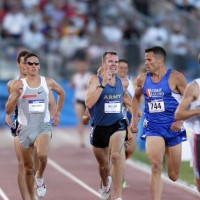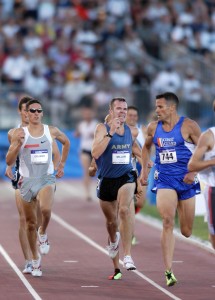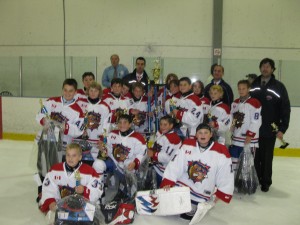
Before I get into the meat of my post today, I want to update everyone on the Pre-Competition Routines for Big Events (PCRBE) program. I am very excited that the first webinar is just about to go live. It will be taking place this Saturday, November 27, 2010 at 4 PM ET.
The membership site is also about to be made available to program members. There has been a bit of delay with it due to some issues with ip addressing, which had to be sorted out with my hosting provider. It all seems to be good now and if you signed up for the program you’ll be receiving a welcome email later today. Inside the members area you will be able to get more details about the webinars as well as be able to submit questions for myself and Susan Garrett to address when we go live.
Now onto the post…
Two weekends ago, the hockey team I coach went to a tournament in Toronto. It was pretty exciting and an opportunity for us to compete against some of the best teams across North America. Although the kids are young (eeek, born in 2000), there was no shortage of competitive spirit, pride, and intensity, and that’s just from the parents.
Here’s a bit of background on our team. We are one of the stronger teams and ranked third in Ontario for this age group. Over the last three seasons, we have a regular season record of 60 wins, 8 losses, and 15 ties. One of the biggest challenges we face is being prepared for these tournaments. It would be easy for our team to take games off during league play and still win, but that would come back to haunt us in these tournaments. We make sure we prepare for every game with the same routine so that we don’t take a game off against a top team in a tournament. As I’m sure the members of the PCRBE program can attest to, the ability to perform consistently comes from an effective pre-competition routine. Our team uses one and it has helped keep the players and coaching staff on track with our goals.
They don’t ask ‘How?’, they ask ‘How many?’
I’ve heard this quote many times around competitive events. Sometimes with good-natured intent, many times, not so much. I know I’ve said it to quite a number of my players after they score a “cheap” goal. They come off the ice after scoring and believe that they didn’t deserve their goal. Really undervaluing their contribution to the team. What I want my players to know is that their effort is important and valued by their teammates and coaches. There will be other times where they deserve to score but don’t. At the end of our tournament, I heard the same quote used with a less positive motive.
As I mentioned, this tournament was a great opportunity for our team to play some other great teams. After winning our division in the opening round we moved on to play in the elimination portion of the tournament. One loss and you’re out. In the round of 16, we were able to maintain our momentum and win setting up a quarter final meeting with the second ranked team in Ontario. It was a hard fought battle, but in the end we came up a goal short. Both teams played their hearts out. It was one of, if not the, best game our team had played all year. And after speaking with the opposing coach after the game, he said the same thing about his team. They played their best.
There was bitter disappointment from many of the players on our team, and a few tears were shed. My message was positive. We talked about all the great things we did as a team during the game and the excitement of playing in such a high quality, competitive contest. By the end, there were smiles and the players were proud with what they accomplished.Speaking with a group of parents after the game, I could see the disappointment on their faces too. I commented on how great the game was and how well our players did, and that’s when the quote was dropped. Essentially, the parent believed that the only thing that mattered was whether or not we won the game. Complete outcome focus. He didn’t care how well his son or any of the other kids played. He considered it a failure, to not have won.
Now let’s look at how goal focus will impact the athlete.
Scenario One – Performance Goal Focus
So in this situation, the coach chooses to focus the team’s attention to how they performed as a team. The hard work we put into practice had come through in our performance during the game. The players can see that they were successful in their performance and that by continuing to work hard they will achieve even greater levels of success in their performance which has side effects – positive outcomes in their games.
Scenario Two – Outcome Goal Focus
In this situation, the coach focuses the team’s attention on how they lost the game. The players know that they have been working really hard in practice to develop their skills, however, this clearly wasn’t good enough. They quickly learn that despite their best efforts during practice, they still failed. Their motivation to continue to work hard in practice diminishes and their development stops, thus feeding into the poor outcomes they will undoubtedly experience in the future.
The underlying issue when you focus your goals on either the competition outcome or your performance is control. You can’t always control the outcome of a competition. When your goals are outcome oriented, you can only contribute your portion to the outcome. You can’t control what your competition does. You can’t control what a judge or referee does. Ultimately, you are leaving your success up to someone else. You can, however, control your performance. You can make changes to your training to improve your performance. When your goals are performance oriented, you can make them happen.
While “they” may not ask “How?”, you should. It’s a dead simple way to get more enjoyment out of your sport and motivate yourself to put in the effort in practice to develop your skills.


Leave A Reply (1 comment so far)
The comments are closed.
Shirley Holmes
14 years ago
how true, I am guilty of trying so hard to go clear in Agility that I loose focus of just going out there to have a good clear round. If I was to improve my performance by changing my practice routine and and focus less on a clear round then I would have a better chance.
Shirley